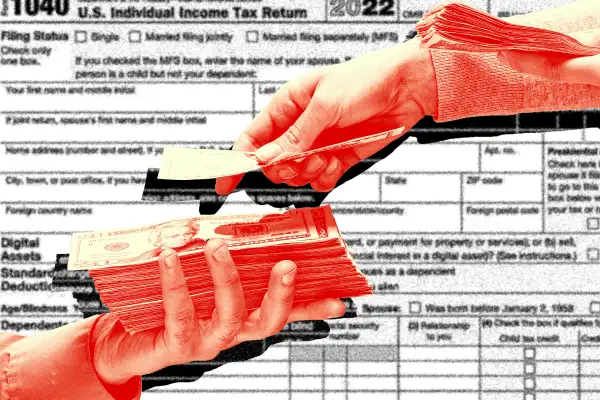The IRS Is Finally Cracking Down on Wealthy Taxpayers Skirting the Law

The IRS says it is using a controversial boost to its budget to crack down on rich Americans who are avoiding paying the taxes they owe — and the effort has already recouped tens of millions of dollars.
It's all thanks to a major tax and climate package dubbed the Inflation Reduction Act, which was signed into law last August and infused the IRS with $80 billion over a 10-year period. In April, the IRS released a plan on how it would use that money, underscoring that it would focus its tax enforcement efforts on high-income earners, not working- and middle-class Americans.
It's making good on that promise.
“Prior to the Inflation Reduction Act, more than a decade of budget cuts prevented IRS from keeping pace with the increasingly complicated set of tools that the wealthiest taxpayers use to hide their income and evade paying their share,” the agency said in a Friday news release. “The IRS is now taking swift and aggressive action to close this gap.”
Already, the IRS says its beefed-up enforcement on millionaires and other high-income earners has generated $38 million in extra revenue. The agency appears to be focusing on a small group of ultra-wealthy Americans who it says are using schemes in Puerto Rico and Malta to avoid paying what the taxes they owe.
“These are particularly egregious cases where instead of filing their taxes and paying their fair share, these people used the money to make lavish purchases,” the IRS says, noting one instance where a millionaire used the money owed to the IRS to instead buy a Maserati and a Bentley.
Key context
While the Inflation Reduction Act initially allotted $80 billion to the IRS, a provision of the recent debt ceiling deal — a last-minute compromise in June to keep the U.S. from defaulting on its debt — clawed back some of that funding.
Upon passing, the law took back $1.4 billion of the new funding, and an additional $20 billion will be redirected from the IRS toward other domestic spending programs over the next two years.
Still, the agency stressed that it has been busy putting the new money to work. In addition to ramping up tax-enforcement efforts, the IRS says it drastically improved its customer service operations for the recent tax filing season, cleared out the remaining backlog of unprocessed 2022 returns and opened dozens of physical taxpayer-assistance centers, among other initiatives to modernize the agency’s sorely outdated technology.
On the other hand...
Not everyone is excited about the IRS’s crackdown on tax avoiders. Shortly after the Inflation Reduction Act passed, some conservative lawmakers railed against the funding, saying the IRS would use it to increase audits on everyday Americans and small businesses.
“Imagine IRS agents descending upon America like a swarm of locusts,” Sen. Ted Cruz, R-Texas, said last August. “And by the way, these IRS agents aren’t there to go after billionaires. They’re there to go after you. They’re there to go after your small business. They’re there to go after your family.”
The Biden administration and the IRS repeatedly promised that it would not increase audits on small businesses and individuals earning $400,000 or less. The agency’s latest status update appears to be aimed at counteracting such critiques. (IRS data on tax year 2019 shows the audit rate is well below 1% for most Americans.)
Still, Republicans in the U.S. House of Representatives are proposing additional funding cuts for the IRS, aimed at curtailing what they call a “supercharged army of 85,000 IRS agents and their associated payroll systems.”
In a call with reporters Thursday, IRS Commissioner Danny Werfel doubled-down on the agency’s focus on high-income earners.
“I hope that we can make the case to Congress and the American people that we are putting our resources to work for them," he said. “Scaling back means less accountability for the wealthy.”
More from Money:
3 Big Tax Prep Sites Secretly Shared User Data With Google and Facebook for Years: Report
13 Weird Things the IRS Considers Taxable, From Bribes to March Madness Pools

